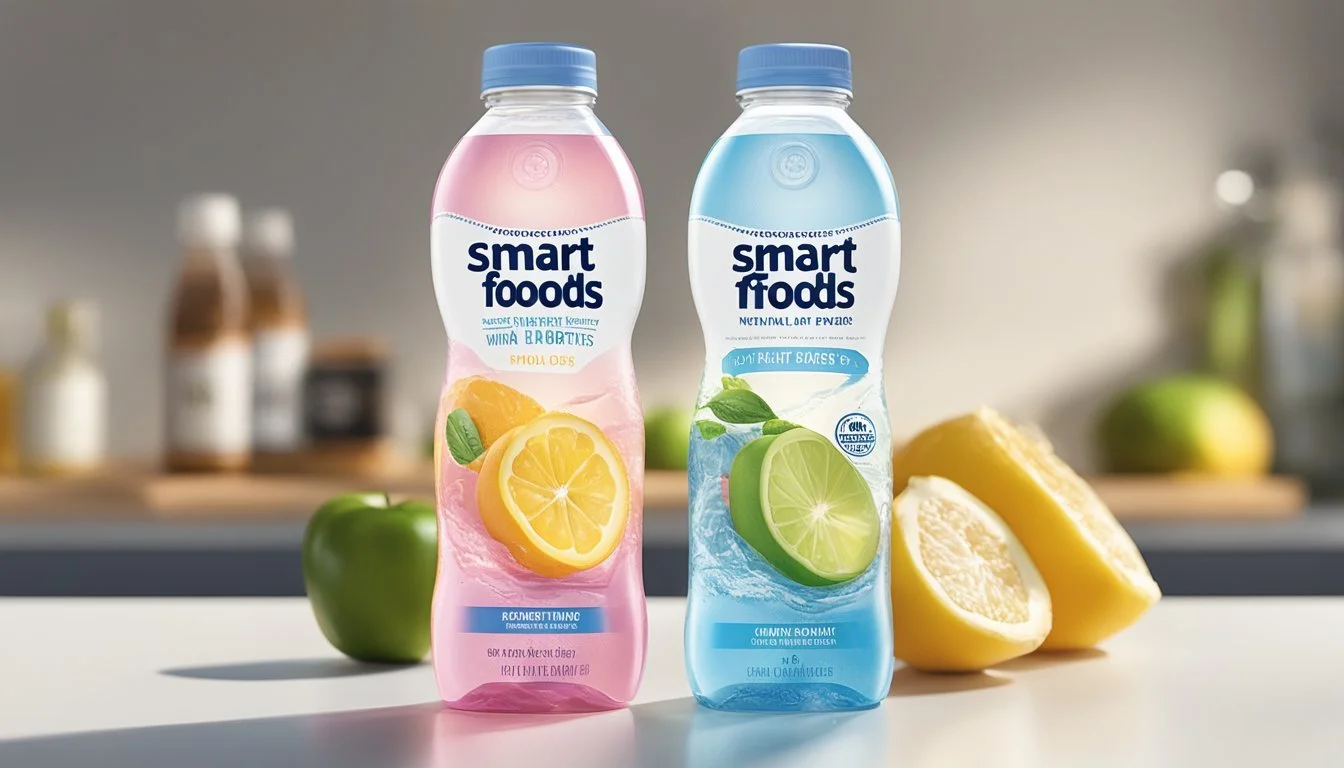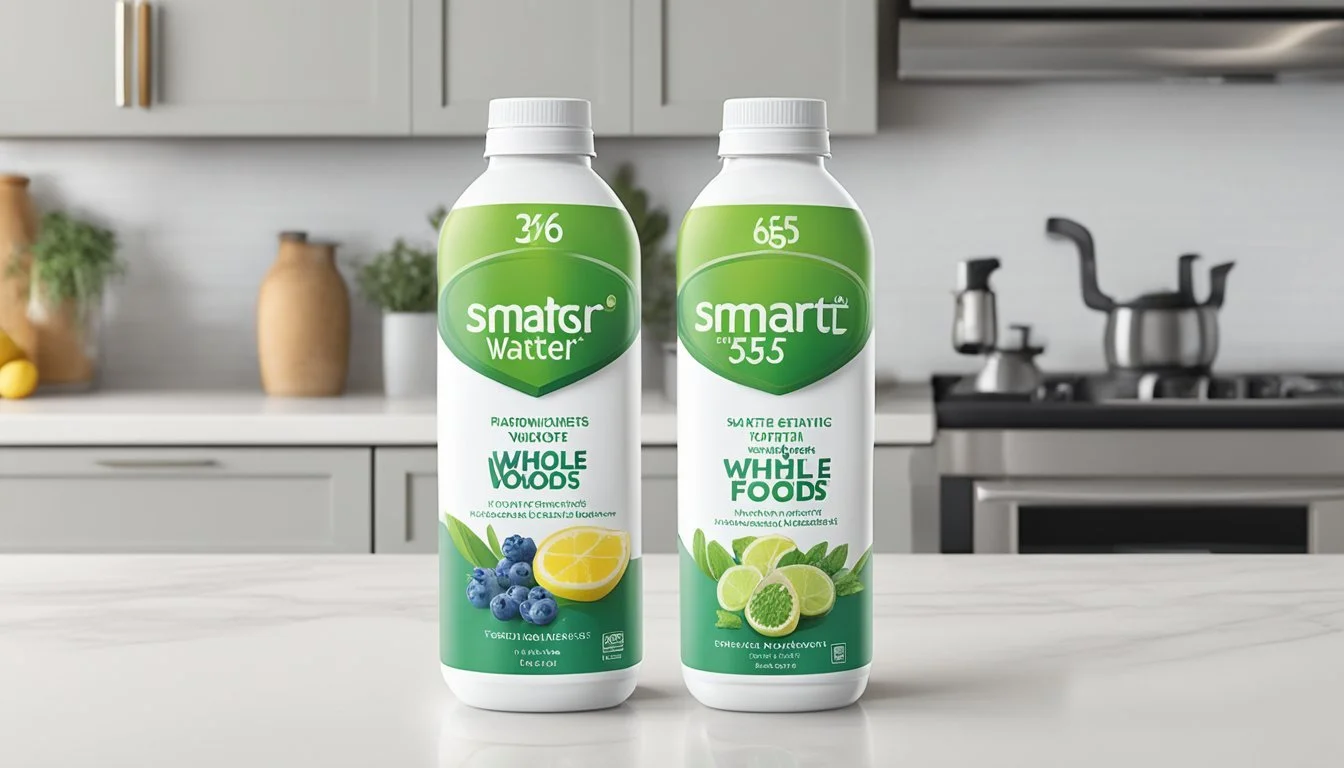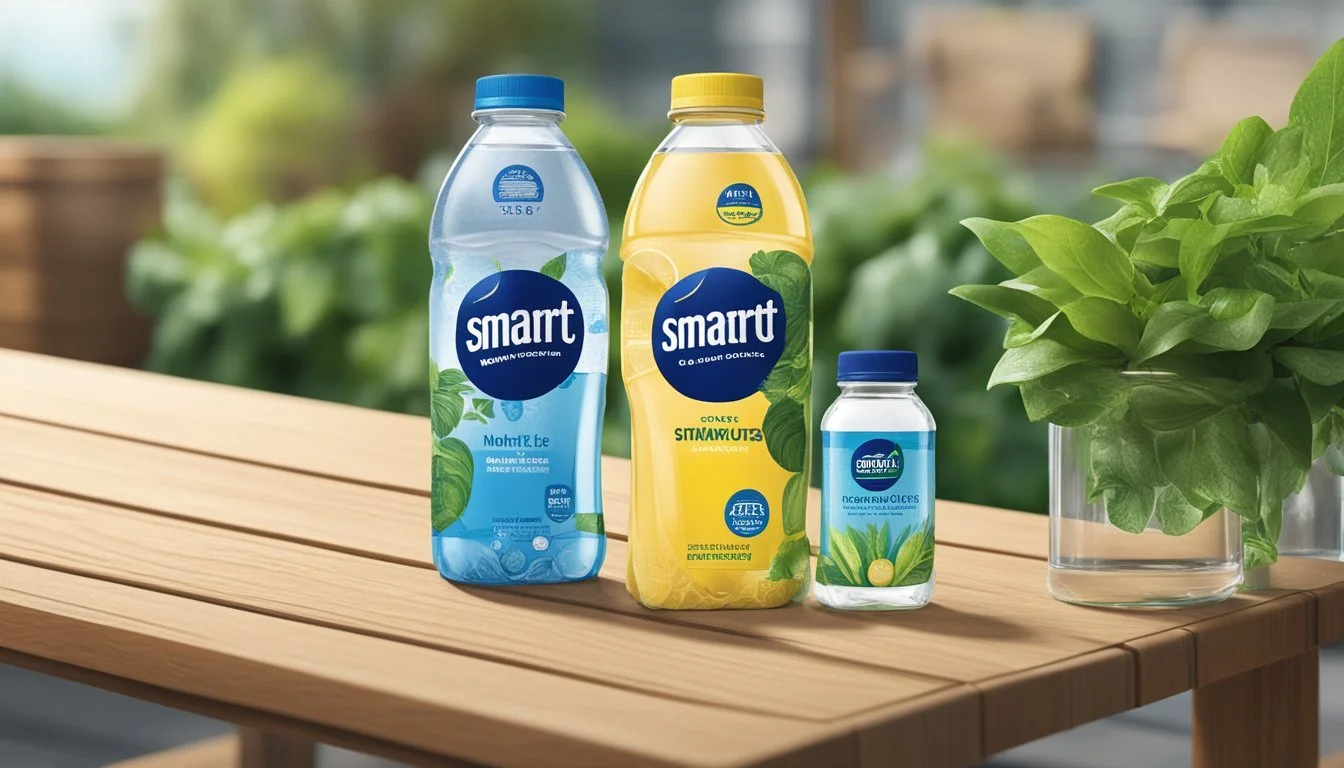Smartwater vs. Whole Foods 365
A Comprehensive Bottled Water Comparison
The debate over which bottled water reigns supreme often leads to a comparison between Smartwater and Whole Foods 365. Smartwater is notable for its vapor-distilled purity and electrolytes that enhance taste, making it a convenient choice for staying hydrated throughout the day.
Whole Foods 365, on the other hand, positions itself as an affordable spring water option. Despite its budget-friendly price, some critics argue that it retains an average taste with a dry aftertaste. For those conscious about both health and taste, this might be a point of contention.
When choosing between these two, it ultimately boils down to what you prioritize—whether it’s the refined taste and added electrolytes of Smartwater or the cost-effectiveness of Whole Foods 365. Each has its merits, making them suitable for different types of consumers.
Overview of Bottled Water
Bottled water is a convenient option for staying hydrated on the go. There are several types of bottled water, each differing in source, processing, and mineral content.
Natural Spring Water: Sourced from natural springs, this type often retains mineral content and is minimally processed.
Mineral Water: Contains naturally occurring minerals and must meet specific standards for mineral content.
Purified Water: Typically sourced from tap or groundwater, then purified to remove contaminants. Methods include distillation, deionization, and reverse osmosis.
Filtered Water: This water undergoes filtration to remove impurities. It might be tap water or groundwater that's been processed.
Carbonated Water: Can be any of the above types of water with carbon dioxide added for fizziness.
Different brands offer various types of bottled water, often highlighting specific benefits. For instance, Smartwater is vapor-distilled and enhanced with electrolytes. On the other hand, Whole Foods 365 offers a spring water product.
To make eco-friendly choices, consumers might consider options packaged in recyclable materials or using minimal plastic.
When comparing bottled water to tap water, consider cost, convenience, and potential health benefits from added minerals. However, tap water in many regions is highly regulated and safe to drink.
Ultimately, the choice depends on personal preferences and priorities, such as taste, convenience, or environmental impact. Whether opting for mineral-rich varieties or purified options, there's a bottled water to suit most needs.
Analyzing the Contenders
Smartwater and Whole Foods 365 are two popular bottled water choices with distinct characteristics regarding their origins, production methods, and overall water quality.
Smartwater: Brand Profile and Manufacturing Process
Smartwater, owned by Coca-Cola, is widely recognized for its purity and clean taste. It originates as vapor-distilled water, a process that involves turning water into vapor to remove impurities and then condensing it back into liquid.
This method mimics the natural hydrologic cycle.
Post-distillation, electrolytes like calcium chloride, magnesium chloride, and potassium bicarbonate are added. These electrolytes enhance the water's taste, giving it a balanced and crisp flavor, preferred by many consumers. Smartwater's unique production process and added electrolytes help distinguish it from other bottled waters on the market.
Whole Foods 365 Water: Brand Profile and Source
Whole Foods 365 Spring Water is sourced from natural springs. The spring water designation indicates that the water is collected directly from a natural spring formation, ensuring it maintains a natural mineral composition.
The production method focuses on minimal processing, primarily filtering and purifying the water to ensure safety and taste.
Some consumers report a slight sour note and a dry aftertaste, which contrasts with the clean flavor profile of many distilled or vapor-distilled waters. At an affordable price point, Whole Foods 365 offers a natural alternative for those preferring less processed water while maintaining a commitment to quality and transparency about its sourcing.
Comparative Health Benefits
Smartwater and Whole Foods 365 each provide unique health benefits through their distinct compositions and nutritional content.
Nutritional Content and Ingredients
Smartwater stands out for its electrolytes. It is vapor-distilled and includes added minerals such as calcium chloride, magnesium chloride, and potassium bicarbonate. These minerals contribute to hydration and can enhance bodily functions like muscle operation and nerve signaling. Smartwater also has zero calories, fat, and protein.
Whole Foods 365, being a spring water, contains naturally occurring minerals like calcium and magnesium. It is free from artificial additives and provides a more natural hydration option. Although it lacks added electrolytes, it still supports hydration and overall health benefits through its natural composition.
Both waters offer distinct advantages, with Smartwater catering more to those needing a precise intake of minerals, while Whole Foods 365 appeals to those preferring a natural, additive-free option.
Taste and pH Levels Comparison
The following section compares the taste profiles and pH levels of Smartwater and Whole Foods 365 Water, providing detailed insights for readers looking to make an informed choice.
Smartwater: Taste Profile
Smartwater is known for its clean, crisp taste. It undergoes a rigorous vapor distillation process, which mimics the hydrological cycle and is meant to remove impurities.
Electrolytes like calcium, magnesium, and potassium are added to Smartwater. These electrolytes not only aid in hydration but also contribute to its smooth, almost sweet taste.
Some describe the taste of Smartwater as refreshing and pure, making it a favorite among those who prefer a subtle profile.
Whole Foods 365 Water: Taste Profile
Whole Foods 365 Water, on the other hand, is sourced from mineral springs. This type of source naturally imparts minerals that can affect the water’s taste.
Compared to Smartwater, 365 Water offers a more mineral-rich taste. This is often noted by water sommeliers who can detect the nuanced flavors.
The taste is often described as robust, providing a satisfying and refreshing drinking experience that appeals to consumers who prefer a stronger mineral presence.
PH Levels and Their Significance
Smartwater has a pH level around 7, which is considered neutral. This balance aligns well with the body's natural pH and supports overall hydration without causing acidity.
Whole Foods 365 Water typically maintains a pH between 6.5 and 7.5. This slightly fluctuates depending on the specific mineral content but remains within a balanced range for drinking water.
The pH levels influence both taste and the perceived health benefits. A neutral pH is gentle on the stomach and helps maintain the body's pH equilibrium, contributing to better hydration and fewer digestive issues.
In essence, while both waters offer quality hydration, their taste and pH differences allow consumers to select based on personal preference and health considerations.
Packaging and Environmental Impact
Both Smartwater and Whole Foods 365 offer distinct packaging options with varying environmental implications. Consumers seeking information on materials, sustainability, and ecological impact will find detailed insights below.
Bottle Materials and Sustainability
Smartwater uses plastic bottles made from PET, which is recyclable. PET plastic is lightweight and popular in the beverage industry due to its durability. However, plastic recycling rates remain low, leading to environmental concerns.
Whole Foods 365, in contrast, offers its bottled water in both plastic bottles and glass bottles. Glass, while more energy-intensive to produce, is environmentally friendly because it is endlessly recyclable. The brand highlights its efforts to use BPA-free materials in its packaging to ensure safer consumption.
Smartwater has also launched initiatives to incorporate recycled plastics into their bottles. Whole Foods 365 emphasizes renewable resources and eco-friendly options. This highlights a competitive edge in sustainability, catering to eco-conscious consumers.
Impact on the Environment
The environmental footprint of bottled water is significant. Smartwater’s PET bottles, like all plastic bottles, contribute to plastic pollution if not properly recycled. Their lightweight nature lessens transportation emissions but still poses long-term waste challenges.
Whole Foods 365's glass bottles, although heavier and more costly to transport, reduce waste due to higher recycling rates. The brand advocates for better waste management practices in their supply chain and community initiatives.
Smartwater’s environmental impact mitigates slightly with the use of recycled materials in their packaging. Whole Foods 365 further reduces its environmental footprint by promoting glass use and sustainable bottling practices. Both brands continue to seek innovations to minimize their ecological impacts, engaging consumers who prioritize environmental responsibility.
Safety and Quality Control
Consumers often prioritize safety and quality when choosing bottled water. This section examines the purity of Smartwater and Whole Foods 365, as well as the regulations and standards that govern their quality.
Purity and Contamination
Smartwater and Whole Foods 365 both commit to high levels of purity. However, recent tests cited by Consumer Reports discovered that some bottled waters, including brands bottled by Spring Hill, contained PFAS chemicals. These PFAS (per- and polyfluoroalkyl substances) are concerning due to their potential health risks.
Smartwater uses a vapor distillation process that aims to remove impurities. This process is effective against many contaminants, including heavy metals like lead, arsenic, and mercury. Whole Foods 365, meanwhile, focuses on sourcing water from natural springs and ensuring it undergoes multiple filtration stages.
Testing for contaminants like PFAS and heavy metals is essential. Brands like Smartwater are usually bundled with rigorous testing procedures to ensure impurities remain at undetectable levels. Consumers should review detailed reports from independent tests to verify the safety claims of any bottled water brand.
Regulations and Standards
Both Smartwater and Whole Foods 365 must adhere to regulations and standards set by the FDA and the EPA. These bodies enforce limits on contaminants, including heavy metals and PFAS chemicals.
The FDA sets standards of quality, including permissible levels of certain contaminants. The EPA establishes guidelines for drinking water quality, impacting how bottled water companies treat and test their products.
Additionally, the International Bottled Water Association (IBWA) offers voluntary guidance. Many reputable brands, including Smartwater and Whole Foods 365, subscribe to these standards, which often exceed federal requirements.
Quality assurance processes, such as regular testing and adherence to both mandatory and voluntary standards, are crucial. They ensure bottled water contains negligible contaminant levels, meeting safety expectations and regulatory compliance.
Price and Accessibility
When comparing Smartwater and Whole Foods 365 bottled water, both price and accessibility are crucial factors for consumers.
Smartwater generally falls on the higher end of the price spectrum. A standard 1-liter bottle of Smartwater typically costs around $1.79 to $2.29. This brand is widely available across many states in supermarkets, convenience stores, and online retailers.
Whole Foods 365 offers more budget-friendly options. For instance, a 500 mL bottle of 365 Spring Water is priced at around $0.69. Their Electrolyte Water in the same size costs approximately $0.79, while the Alkaline Water (1 liter) is about $1.29. Whole Foods 365 water is available at Whole Foods Market locations and through their online shopping platforms.
Price Comparison (Per 500 mL):
Water Type Smartwater Whole Foods 365 Standard/Spring ~$1.00 $0.69 Electrolyte Water ~$1.00 $0.79 Alkaline Water ~$1.00 $0.65 (per 500 mL equivalent)
Smartwater’s widespread availability makes it easily accessible in numerous states, ensuring consumers can find it without much hassle. Whole Foods 365 is primarily found in Whole Foods Market locations, which might limit availability to areas with these stores.
Smartwater and Whole Foods 365 both cater to different market segments. Smartwater offers a premium option with extensive accessibility, while Whole Foods 365 provides cost-effective choices for budget-conscious consumers.
Consumer Preferences and Trends
Consumers seek bottled water that provides purity, taste, and health benefits. Popular choices include Smartwater and Whole Foods 365.
Smartwater appeals to those who prioritize balanced hydration. It offers varieties like Smartwater Alkaline to suit different needs.
Whole Foods 365 is chosen for affordability while maintaining acceptable quality. Priced at 69 cents, it attracts budget-conscious customers.
A trend towards carbonated options like La Croix, Topo Chico, and Perrier has emerged. These brands offer a refreshing twist compared to noncarbonated bottled waters.
Sports drinks and bottled waters such as LIFEWTR and Core Hydration target athletes and fitness enthusiasts. They aim to deliver enhanced hydration post-exercise.
Dasani and Aquafina remain staple choices for many due to their widespread availability and consistent quality.
Voss is often selected for its premium feel and glass bottle packaging, appealing to those who appreciate aesthetics.
In conclusion, different bottled waters and sports drinks offer unique features catering to diverse preferences and lifestyle needs. Each brand finds its niche based on factors such as pH balance, cost, or convenience.
Conclusion
Smartwater and Whole Foods 365 present distinct options in the bottled water market.
Smartwater is renowned for its vapor-distilled process and the addition of electrolytes for taste. This water aims to offer a crisp, clean flavor.
Benefits of Smartwater:
Vapor-distilled for purity
Electrolytes for taste enhancement
Whole Foods 365 offers a straightforward, spring water experience. It is marketed as a more economical choice, priced at around 69 cents per bottle.
Advantages of Whole Foods 365:
Cost-effective option
Sourced from natural springs
Environmental Impact: The environmental considerations of bottled water are significant. Smartwater bottles are often made from plastic, which raises sustainability concerns. Whole Foods 365 bottles, also plastic, may have a similar environmental footprint.
Hydration: Both options provide essential hydration. Smartwater's added electrolytes might appeal to those seeking enhanced taste, while Whole Foods 365 caters to consumers looking for pure spring water without added elements.
Users should weigh their preferences regarding taste, cost, and environmental factors to determine which brand suits their needs best.







